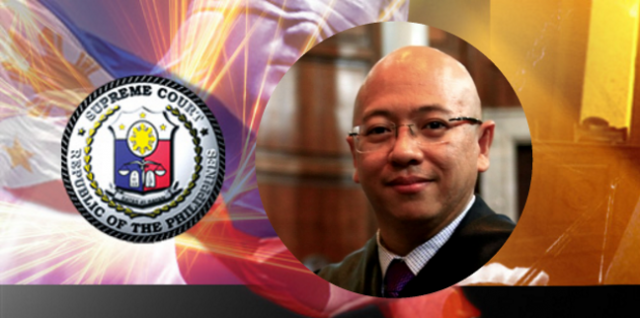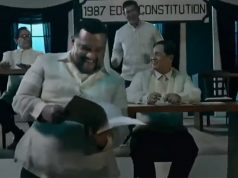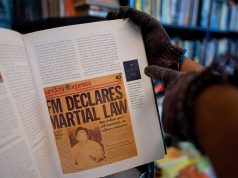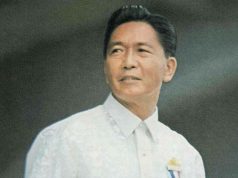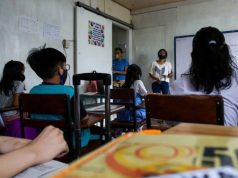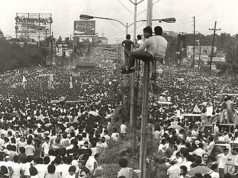MANILA – Former Solicitor General Florin Hilbay, the counsel of former Commission on Human Rights chair and partylist congresswoman Loretta Ann Rosales in her petition questioning the extension of Martial Law in Mindanao before the Supreme Court, has reminded the public about the possibility that freedom of the press could be restricted under Martial Law.
At the same time, elections may be suspended.
During oral arguments on the matter Tuesday, Senior Associate Justice Antonio Carpio asked Hilbay if freedom of expression and of the press still prevail under Martial Law.
Hilbay replied that it will depend on the assessment of the commanding general if there is a need to restrict the freedom of the press.
“There might be a necessity for that, in certain areas, which is why what we’re saying is that the President must establish factual basis for the reasons for exercising Martial Law. Does he want to restrict freedom of the press in the whole of Mindanao? We want to know,” he said.
It is the President, his military officers, and the commanding general who have the authority to close down the press during Martial Law, Hilbay added.
Carpio then asked if a publisher can question the decision of shutting down the press during Martial Law.
“If the courts are functioning, he can, and probably should,” was Hilbay’s reply.
Carpio noted that, according to the Constitution, the declaration of Martial Law does not suspend the operation of the Constitution or the Bill of Rights. Why then, he asked, did Hilbay say that the military commander can suspend the publication of a newspaper?
“In a theater of war, your honor, where there is actual fighting, everything will have to yield to the law of necessity,” Hilbay explained. “If the military commanders believe that nobody should use Facebook, (or) no newspapers should be circulated because the enemies might have infiltrated the presses, then that may be a decision that will have to be made by the military governor on the ground. Which is why you need to have a theater of war before the commanding general is able to exercise such an extraordinary power.”
Carpio further clarified whether this means that in an area under Martial Law, the commanding officer can suspend the Bill of Rights.
“That is a possible consequence, your honor. If it is necessary,” Hilbay said.
And as to whether elections are suspended, Hilbay replied that this will depend on whether the election officers are even able to function.
Carpio then concluded that one of the consequences of Martial Law is that “elections may be suspended.”
Earlier, Carpio echoed the definition of Martial Law based on Lagman versus Medialdea, and as cited by Hilbay, which states that it is “the assumption of jurisdiction by the military over the civilian population in the theater of war” – meaning a war is going on.
Given this, Carpio asked whether military courts supplant civilian ones in areas under Martial Law.
Hilbay said that it is possible, depending on the facts on the ground. For example, the commanding general may be required to assume the power of a judge if rebels occupy the city hall, making it difficult for judges to hear “the usual cases”.
Carpio then asked who has supervision and control over local elected officials under Martial Law.
Hilbay answered that there may be cases where the local government are not able to function under this “theater of war.” And in certain cases, it may be necessary for the commanding general to assume the function of a legislator so that law and order may be imposed in wartime.
As for whether a military commander can simply search and seize without warrants from the court, Hilbay said it is possible.
“If the military says we’re going after the rebels or invaders, it might be difficult for the citizens to claim unreasonable search and seizure. It might be difficult for the citizens to invoke ordinary rights of privacy,” he added.
But, Carpio noted, this is only if the military commander will claim that these people are rebels. He cannot effect searches and seizures for grounds other than rebellion.
Hilbay acknowledged this, adding that according to one of the framers of the 1987 Constitution, Fr. Joaquin Bernas, “The intention was to go back to the old American understanding of Martial Law, which is to limit it to a theater of war. Why? Because under the 1935 Constitution, what President (Ferdinand) Marcos did was to declare Martial Law in the entirety of the Philippines, even in the absence of a theater of war. He invoked the imminent threat clause under the 1935 Constitution, which of course is a colonial charter, which was very liberal for the President, to be able to declare Martial Law on fake grounds.”
Hilbay continued, “The intention of the 1987 Constitution, and the framers in 1986, was to limit the abuse, to prevent such abuse of power, and therefore they went back to the traditional American conception, which is you can only impose Martial Law if the civilian authorities are finding it difficult to operate in a theater of war.
“In the absence of a theater of war, there’s no need to impose Martial Law. You only exercise military force.”
He stressed that, given the changed facts on the ground in Mindanao, and given the declarations of President Rodrigo Duterte and the military (presumably that Marawi City has been liberated), it is the constitutional duty of the Supreme Court to reassess the factual basis of the declaration of Martial Law in Mindanao.
“That is why it is essential to determine that there is actual rebellion, because the effect, if you declare Martial Law, is that you are saying there is a theater of war, correct?” Carpio asked.
Hilbay replied, “Yes, your honor.”

